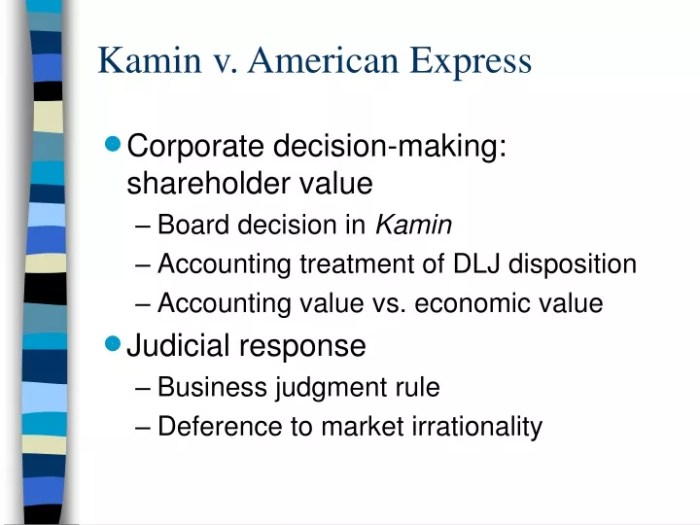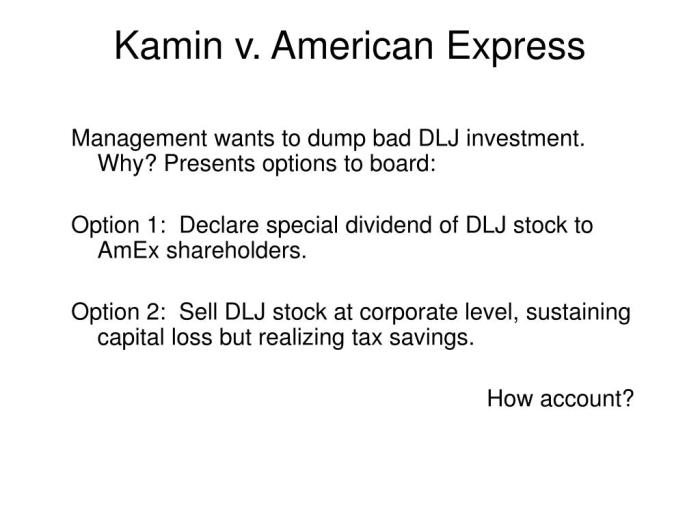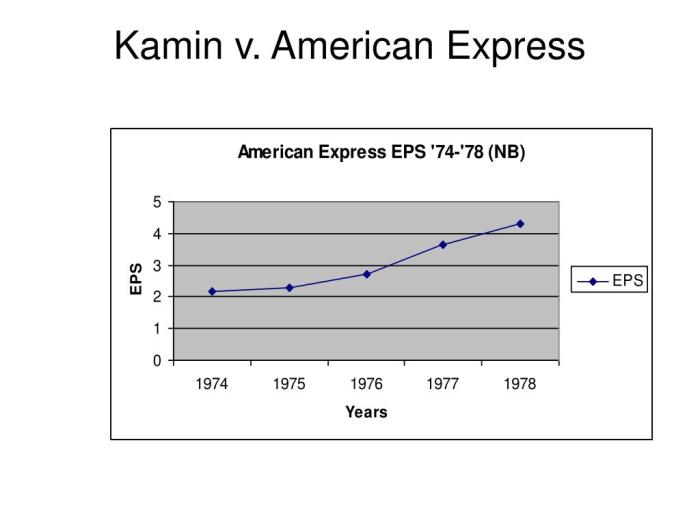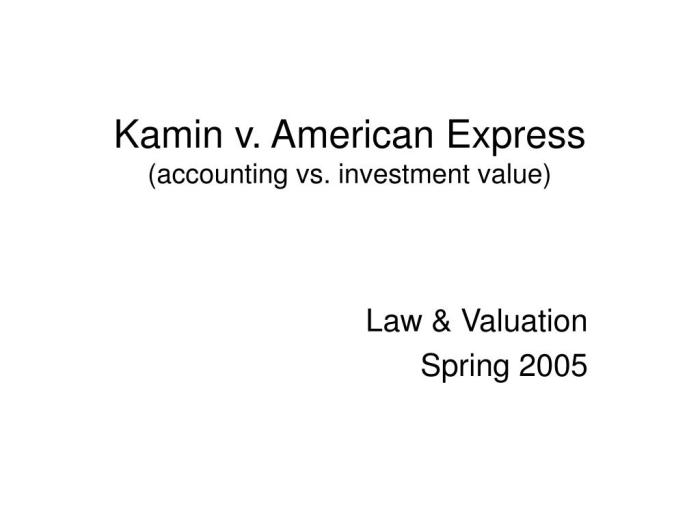Kamin v american express company – Kamin v. American Express Company, a seminal antitrust case, has profoundly shaped the legal landscape surrounding competition in the credit card industry. This case, filed in 1979, alleged that American Express had engaged in anticompetitive conduct, including tying arrangements and monopolization, to maintain its dominance in the market.
The case raised significant legal questions regarding the definition of relevant markets, the analysis of anticompetitive conduct, and the application of antitrust laws to essential facilities. The outcome of Kamin v. American Express has had far-reaching implications for competition in various industries, serving as a precedent for future antitrust cases.
Background and Overview of Kamin v. American Express Company
Kamin v. American Express Company was a landmark case decided by the Supreme Court of the United States in 1997. The case involved a class action lawsuit brought by merchants against American Express, alleging that the company’s practice of setting maximum prices that merchants could charge for goods and services purchased with American Express cards violated antitrust laws.
Key Legal Issues
The key legal issues raised in the case included:
- Whether American Express’s practice of setting maximum prices was an unreasonable restraint of trade under Section 1 of the Sherman Antitrust Act.
- Whether American Express had market power in the credit card market.
- Whether the merchants had suffered antitrust injury.
Antitrust Allegations

The plaintiffs in Kamin v. American Express Companyalleged that American Express violated the antitrust laws by engaging in anti-competitive practices, including:
- Exclusive dealing arrangements with merchants, which required merchants to accept American Express cards and not compete with American Express’s card fees.
- Tying arrangements, which forced merchants to accept American Express cards in order to accept other payment cards.
- Price fixing, by setting minimum prices for merchants to charge for goods and services purchased with American Express cards.
Relevant Antitrust Laws
The relevant antitrust laws at issue in Kamin v. American Express Companyincluded:
- Section 1 of the Sherman Act, which prohibits agreements in restraint of trade.
- Section 2 of the Sherman Act, which prohibits monopolization, attempted monopolization, and conspiracies to monopolize.
- Section 3 of the Clayton Act, which prohibits exclusive dealing and tying arrangements that may substantially lessen competition.
Market Definition and Anticompetitive Conduct

The court defined the relevant market as the market for charge card services in the United States. This market was defined as the group of consumers who were willing and able to use charge cards to make purchases. The court found that this market was distinct from the market for other forms of payment, such as cash, checks, and debit cards.
Both sides presented evidence regarding anticompetitive conduct. American Express argued that it did not have monopoly power in the market for charge card services and that its practices were not anticompetitive. Kamin, on the other hand, presented evidence that American Express had monopoly power and that its practices were anticompetitive.
Evidence of Anticompetitive Conduct
- American Express had a large market share in the market for charge card services.
- American Express had a number of practices that made it difficult for other companies to compete, such as exclusive dealing contracts with merchants and high fees for merchants who accepted American Express cards.
- American Express engaged in predatory pricing, which is the practice of selling a product or service at a below-cost price in order to drive competitors out of the market.
Tying Arrangements and Essential Facilities

The court analyzed the alleged tying arrangements by examining whether American Express conditioned the issuance of its credit cards on the acceptance of its merchant services. The court found that American Express had sufficient market power in the credit card market to impose such a condition, and that the tying arrangement had anticompetitive effects in the merchant services market.
The concept of essential facilities is relevant to the case because American Express’s credit card network was found to be an essential facility for merchants who wanted to accept credit cards. The court held that American Express’s refusal to deal with merchants who did not accept its merchant services was an abuse of its dominant position in the credit card market.
Tying Arrangements
A tying arrangement is an agreement in which the sale of one product or service (the “tying product”) is conditioned on the purchase of another product or service (the “tied product”). Tying arrangements are illegal under antitrust law if they have the purpose or effect of lessening competition in the market for the tied product.
In the case of Kamin v. American Express Company, the alleged tying arrangement was the requirement that merchants who wanted to accept American Express credit cards also had to accept American Express merchant services. The court found that American Express had sufficient market power in the credit card market to impose such a condition, and that the tying arrangement had anticompetitive effects in the merchant services market.
Essential Facilities
An essential facility is a facility or resource that is necessary for a business to compete in a particular market. Essential facilities are often monopolies or near-monopolies, and their owners may have the power to exclude competitors from the market.
In the case of Kamin v. American Express Company, the American Express credit card network was found to be an essential facility for merchants who wanted to accept credit cards. The court held that American Express’s refusal to deal with merchants who did not accept its merchant services was an abuse of its dominant position in the credit card market.
Impact on the Industry and Competition

The Kamin v. American Express lawsuit has significant implications for the credit card industry and competition within the market.
Impact on the Credit Card Industry
The lawsuit could potentially reshape the dynamics of the credit card industry. If American Express is found to have engaged in anti-competitive practices, it could face significant penalties and be forced to change its business practices.
- Reduced barriers to entry for new competitors: If American Express’s exclusive contracts with merchants are deemed illegal, it could open up the market to new players.
- Lower fees for merchants: American Express currently charges higher fees to merchants than other credit card companies. A successful lawsuit could force American Express to lower these fees, benefiting merchants and consumers.
- Increased competition and innovation: A more competitive credit card market could lead to increased innovation and new products and services for consumers.
Broader Implications for Competition, Kamin v american express company
The outcome of the Kamin v. American Express lawsuit could also have broader implications for competition in the market.
- Deterrence of anti-competitive behavior: A successful lawsuit against American Express could send a strong message to other companies that anti-competitive practices will not be tolerated.
- Strengthening of antitrust laws: The lawsuit could help strengthen antitrust laws and make it easier for regulators to enforce competition laws.
- Protection of consumer welfare: Competition is essential for protecting consumer welfare. A more competitive credit card market could lead to lower prices, better products, and more innovation for consumers.
Legal Precedents and Implications
The court’s decision in Kamin v. American Express Companywas influenced by several relevant legal precedents.
One precedent was the Supreme Court’s decision in United States v. Standard Oil Co. of New Jersey(1911). In Standard Oil, the Court held that a company could be found liable for antitrust violations even if it did not have a monopoly in the relevant market. The Court found that Standard Oil’s control over the market was sufficient to give it the power to restrain trade.
Implications for Future Antitrust Cases
The decision in Kaminhas implications for future antitrust cases involving tying arrangements and essential facilities. The decision makes it clear that companies cannot use their control over an essential facility to foreclose competition.
The decision also provides guidance on the definition of the relevant market in antitrust cases. The court held that the relevant market in Kaminwas the market for merchant credit card services. This definition is narrower than the definition of the relevant market that American Express had proposed, which included all credit card services.
Key Questions Answered: Kamin V American Express Company
What was the primary antitrust allegation in Kamin v. American Express?
The plaintiffs alleged that American Express had engaged in tying arrangements, forcing merchants to accept both its credit card and its travel-related services in order to accept American Express cards.
How did the court define the relevant market in Kamin v. American Express?
The court defined the relevant market as the market for general-purpose credit cards issued in the United States.
What was the significance of the concept of essential facilities in Kamin v. American Express?
The court held that American Express’s credit card network was an essential facility, meaning that it was indispensable for merchants to accept credit cards. This finding played a key role in the court’s determination that American Express had engaged in anticompetitive conduct.